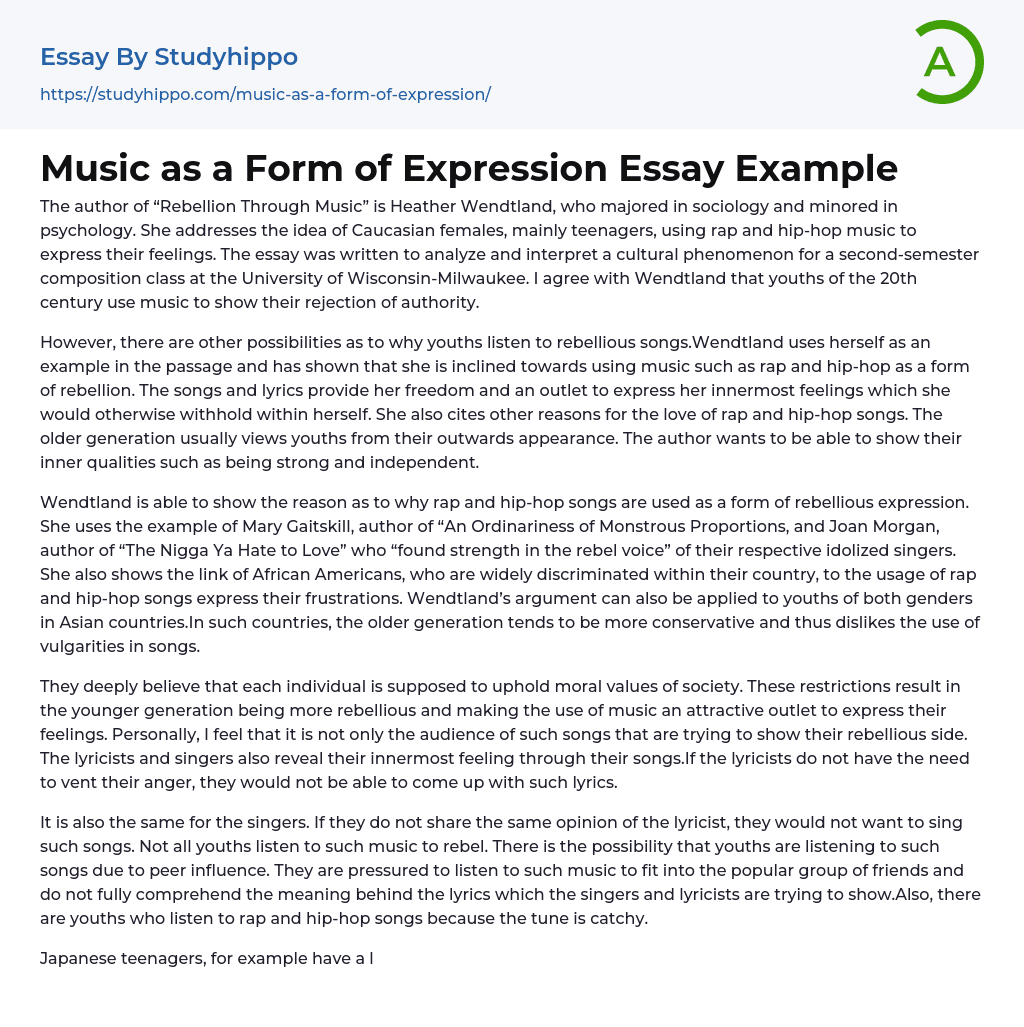The author of “Rebellion Through Music” is Heather Wendtland, who majored in sociology and minored in psychology. She addresses the idea of Caucasian females, mainly teenagers, using rap and hip-hop music to express their feelings. The essay was written to analyze and interpret a cultural phenomenon for a second-semester composition class at the University of Wisconsin-Milwaukee. I agree with Wendtland that youths of the 20th century use music to show their rejection of authority.
However, there are other possibilities as to why youths listen to rebellious songs.Wendtland uses herself as an example in the passage and has shown that she is inclined towards using music such as rap and hip-hop as a form of rebellion. The songs and lyrics provide her freedom and an outlet to express her innermost feelings which she would otherwise withhold
...within herself. She also cites other reasons for the love of rap and hip-hop songs. The older generation usually views youths from their outwards appearance. The author wants to be able to show their inner qualities such as being strong and independent.
Wendtland is able to show the reason as to why rap and hip-hop songs are used as a form of rebellious expression. She uses the example of Mary Gaitskill, author of “An Ordinariness of Monstrous Proportions, and Joan Morgan, author of “The Nigga Ya Hate to Love” who “found strength in the rebel voice” of their respective idolized singers. She also shows the link of African Americans, who are widely discriminated within their country, to the usage of rap and hip-hop songs express their frustrations. Wendtland’s argument can also be applied to youths of both genders in Asian countries.I
such countries, the older generation tends to be more conservative and thus dislikes the use of vulgarities in songs.
They deeply believe that each individual is supposed to uphold moral values of society. These restrictions result in the younger generation being more rebellious and making the use of music an attractive outlet to express their feelings. Personally, I feel that it is not only the audience of such songs that are trying to show their rebellious side. The lyricists and singers also reveal their innermost feeling through their songs.If the lyricists do not have the need to vent their anger, they would not be able to come up with such lyrics.
It is also the same for the singers. If they do not share the same opinion of the lyricist, they would not want to sing such songs. Not all youths listen to such music to rebel. There is the possibility that youths are listening to such songs due to peer influence. They are pressured to listen to such music to fit into the popular group of friends and do not fully comprehend the meaning behind the lyrics which the singers and lyricists are trying to show.Also, there are youths who listen to rap and hip-hop songs because the tune is catchy.
Japanese teenagers, for example have a low grasp of the English language. They can be singing along to rap and hip-hop songs without realizing what it means. In conclusion, Wendtland’s depiction of youths trying to voice out their innermost feeling by singing along with rap and hip-hop songs is reflected not just in her society but in Asian societies as well. The author
is also quite successful in bringing out the point that teenage Caucasian females are trying to show their rebellious side and innermost feelings with the help of rap and hip-hop songs.
- Teenagers essays
- Millennials essays
- Teenage Drinking essays
- Teenage Suicide essays
- Sonnet essays
- Concert essays
- Piano essays
- Hip Hop essays
- Music Reference essays
- Musical Instruments essays
- Mp3 essays
- Recording essays
- Music video essays
- Singing essays
- Song essays
- Tupac shakur essays
- Classical Music essays
- Opera essays
- Rock Music essays
- Blues essays
- Jazz essays
- Sonata essays
- Baroque Music essays
- Rock And Roll essays
- Ludwig Van Beethoven essays
- Michael Jackson essays
- Popular music essays
- Band essays
- Classical Concert essays
- Music Concert Report essays
- Music Awards essays
- Walk This Way essays
- Song Analysis essays
- Adolescence essays
- Childhood essays
- Growth Mindset essays
- Individual essays
- Infant essays
- Is Google Making Us Stupid essays
- Anthropology essays
- Audience essays
- Charity essays
- Cultural Competence essays
- Emile Durkheim essays
- Gender Roles essays
- Generation essays
- Globalization essays
- Interpersonal Relationship essays
- People essays
- Race essays




